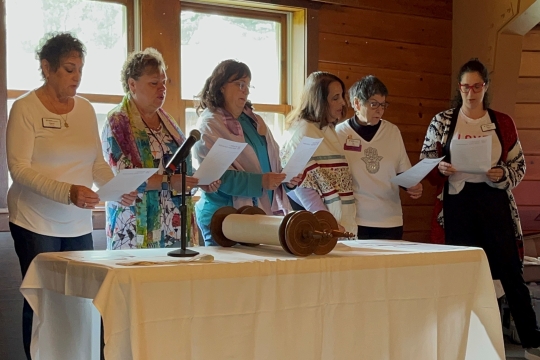
When I decided to write the D'var Torah on this week's parashah, I was intrigued by the many stories in this portion – all of which would provide rich fodder for a deep dive and thoughtful reading. And to be honest, I have started and then erased at least two other versions of this piece. To briefly summarize, this week's parashah begins with the story of Joseph, including his relationship with his father and brothers. It's also the story of Tamar and her father-in-law, Judah, Joseph's older brother, and Joseph and Potiphar's wife. It includes Joseph's ability to interpret his and other peoples' dreams. Many of those who have written on this portion focus on Tamar, and rightfully so. Hers is a story of a woman who acts courageously to secure her future and continue Judah's family lineage, which later produced King David. Some point out Jacob's culpability in the Joseph story, specifically saying that he clearly favored Joseph and chose to ignore the increasing animosity between the brothers.
I was interested in the lessons of Tamar but even more interested in the beginning of Joseph's story. When we meet him, he appears to be a spoiled child, flaunting his place as his father's favorite and tattling on his brothers. By the end of our portion, he has matured into a young man who refuses the advances of a rich and powerful woman, is responsible for the people who share his prison, and notices that the cupbearer and the baker are "out of sorts." He interprets dreams rather than just dreaming of his own power and asks only that he be remembered by the cupbearer when he returns to his position with the Pharaoh. Reading ahead, we see that he treats his brothers with compassion and love.
What brought about this amazing transformation? Circumstances, of course – being away from his father and his brothers, he had to rely on his own wits and abilities and learn how to get along with others.
Certainly, we can all relate to this part of Joseph's story. I have two sons, who I am ridiculously proud of. I can clearly see the changes in their personalities and behavior since they moved away and established their own homes. While they were never spoiled – just ask them! – they had comfortable lives as children. They bickered, they fought, and they were typical self-centered teenagers. As they have confronted adulting – finding spouses, getting jobs, dealing with disappointments and difficult things, they have dealt with these issues with increasing maturity, kindness, and thoughtfulness.
However, attributing Joseph's changes to circumstances ignores an integral part of the narrative. We read:
"The Lord was with Joseph, and he was a successful man, and he was in the house of the Egyptian master. And his master saw that the Lord was with him, and whatever he (Joseph) did the Lord made prosper in his hand."
As in so many stories we read in the Bible, God enables the hero of this story to succeed. Although the parashah doesn't specify that Joseph had faith in God, it seems clear to me that he did. If we use that lens – that Joseph had a relationship with God – his dreams and ability to interpret dreams is more understandable, as well as his personality shift. Dreams are often a way to communicate with God, or a way to communicate with the deepest parts of ourselves. Joseph's dreams get him into trouble with his father and brothers, but his ability to understand them leads him to be chosen by the Pharaoh and to continue the story of our people. Unlike Jacob, Joseph's father, Joseph did not encounter God in his dreams, but his dreams propelled him to do God's work – the holy work of partnership with God.
If we expand our definition of dreams from a "series of thoughts, images, and sensations occurring in a person's mind during sleep," to "cherished aspiration, ambition, or ideal," we can look at Joseph's dreams and interpretations and think of them in terms of our own lives.
How often do we listen to our dreams, or the dreams of others, and pay attention to their message? As a past WRJ board member and current Chai Society member, I am privileged to travel to women's groups as a speaker. In the before times, pre-Covid, a speaker's bureau trip usually meant spending some one-on-one time with members of the women's group, talking about not just their group, but also about their lives and their personal leadership journeys. Over coffee, tea, or wine, we talked about our children, our jobs, and our hopes for the future.
Over the years, I have heard so many stories of women who had big dreams for themselves, their families, and yes, even their women's groups but had let them go because they were told to be realistic and get their heads out of the clouds. They were told that their dreams would never come true. During those conversations, I encouraged those women to revisit their dreams. I told them that, as with our friend Joseph, dreams could be connections with God and our most authentic selves, and we owe it to ourselves to try to make them come true. I suggested something that has helped me - keeping a journal and writing down my hopes and dreams for myself, my children, and even society in general. I regularly reread what I've written: revisiting those pages helps me focus on what is truly possible and helps me envision the future.
Like Joseph in our parashah, and his father Jacob before him, we can encounter God or act as God's partner by believing in our dreams and acting on them. One of my favorite quotes about dreams is from Eleanor Roosevelt "The future belongs to those who believe in the beauty of their dreams." How true for the characters in this week's parashah, and how true for all of us who are open to believing in our dreams.
Related Posts

Parashat Yom Rishon shel Rosh HaShanah

Cultivating a Culture of Accountability and Belonging


